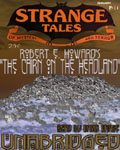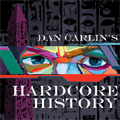
My name is Anne and I have been invited to write this guest post. Today I’ll be handing you Five of my Favorite Free podcasts. You can find more about the podcasts I like, on my podcast review blog “Anne Is A Man.” There you’ll see, I have a preference for history podcasts, so this is what I want to share with you today: my five hot history tips…

Oh, and by the way, I am a man; the man called Anne – can you imagine? That has a history in itself. I am of Dutch origin, but even among that peculiar people Annes are mostly women. Just not me, and not my grand dad, whom I was named after. Stubborn, contrary people, from the north. I do not live there anymore, however. Nowadays I live in Israel. Israelis pronounce my name as Anna and there are no other men named Anna in Israel, I can assure you. It doesn’t get any better. So, after a life of explanations, I called my blog Anne is a Man!
1.
 History 5
History 5
My all time favorite History Podcast is a lecture series from Berkeley. They deliver it twice a year and publish it as a podcast. If you write a nice email to the GSI’s, they’ll share the power point with you and you can see the visuals, but without them, the lectures are no less intriguing. The course is called History 5 and consists of near 30 lectures telling European History from the Renaissance until today, or 1989 – as close as historians dare to venture to the present. If you take up the course you will either run into Professor Thomas Laqueur, the man who can hysterically giggle, or into Professor Margaret Lavinia Anderson, Peggy for short, who sounds like an American version of McGonnagall from Harry Potter – fair, but rigid and distant. Then again, this lecture she begins with: “I apologize for always talking about sex so much. I know it is nothing you are interested in, but in any case […] it would be an appropriate introduction to Freud.” And here you’ll hear stories of Freud and the nineteenth century in Europe, you wouldn’t believe.
Recommended |MP3|
2.
 In Our Time
In Our Time
The second podcast is also an institutionalized production: BBC’s In Our Time. This radio programme is led by a member of the house of Lords, no less, Melvyn Bragg. He is accompanied each issue by three specialists from the field, to discuss a subject in this ongoing series about the history of thought. Right after the broadcast, the recording is put on-line as a podcast, but is removed the next week. If you want to listen from the archive, it can only be done in stream. There is a veritable multitude of streams I could point to, really, very nearly all of them are top notch history, philosophy and elite entertainment. But since I have to choose, let me point you to the issue about King Lear. This will not only relate to Shakespeare’s drama, but also to the folk tale of King Leir, that lay the basis to the story but was radically altered by the Renaissance playwright, with magnificent consequences, for drama, surprise and added depth to the plot.
Recommended: |RealAudio| (stream)
Podcast feed: http://downloads.bbc.co.uk/podcasts/radio4/iot/rss.xml
3.
 Historyzine
Historyzine
So far so good with the podcasts that are not true podcasts, but recordings that were delivered as podcast on the side. Let’s move to the true, intended, amateur, dedicated podcasts and start with Historyzine. This history podcast is made by the Englishman Jim Mowatt, who has a preference for reenactments of historical battles and who uses the Historyzine podcast as a series to recount the ins and outs of the Spanish War of Succession – a power struggle in Europe that allegedly was about the throne of Spain, but deep down was about hegemony and confronted France’s Louis XIV with the English and the Dutch among others. Here is the first installment, I guess you can take it from there.
Recommended: |MP3|
Podcast feed: http://historyzine.com/feed/
4.
 Binge Thinking History Podcast
Binge Thinking History Podcast
Another Brit to make a great history podcast in his spare time is Tony Cocks, of the Binge Thinking History Podcast. In nine podcasts he has covered two subjects so far. The first are the British roots of the American constitution and the second was the Battle of Britain. The last is the part of World War II of which Churchill said: ‘never so many owed so much to so few.’ But lately some debunking has been going on about this phrase. After Tony has talked us through the battle, he delivered an excellent episode, summing it all up and drawing the conclusions. Listen to find out whether he debunks the myth of the Battle of Britain with its few heroes as well.
Recommended |MP3|
Podcast feed: http://bingethinkinghistory.libsyn.com/rss
5.
 The German Cultural History podcast
The German Cultural History podcast
The last recommendation is one for the history die-hards. The German Cultural History podcast (and its related blog) is made by by an enthusiastic academic, who doesn’t care too much about sound quality and post-production. He just dives head-first into the subject and gets to the point. His breadth and depth are amazing and what he manages to put in in his approx 30 minute installments has got to be the definitive picture of Medieval German Culture. But you have to be ready to bear with him. Not only with the substandard sound, also with the tangents he takes on in his enthusiasm, especially when it is about the roots of the German language. Once, you open up for it, you really get something. In my opinion, sometime the less polished material, the rawer material, has a more accurate content or strikes as more genuine. The best episode (so far) is the one where the host takes us to Iceland, to Snorri Sturluson, to find the roots of Germanic paganism.
Recommended: |MP3|
Podcast feed: http://feeds.feedburner.com/GermanCulturalHistory
Posted by Anne of the Anne Is A Man blog










